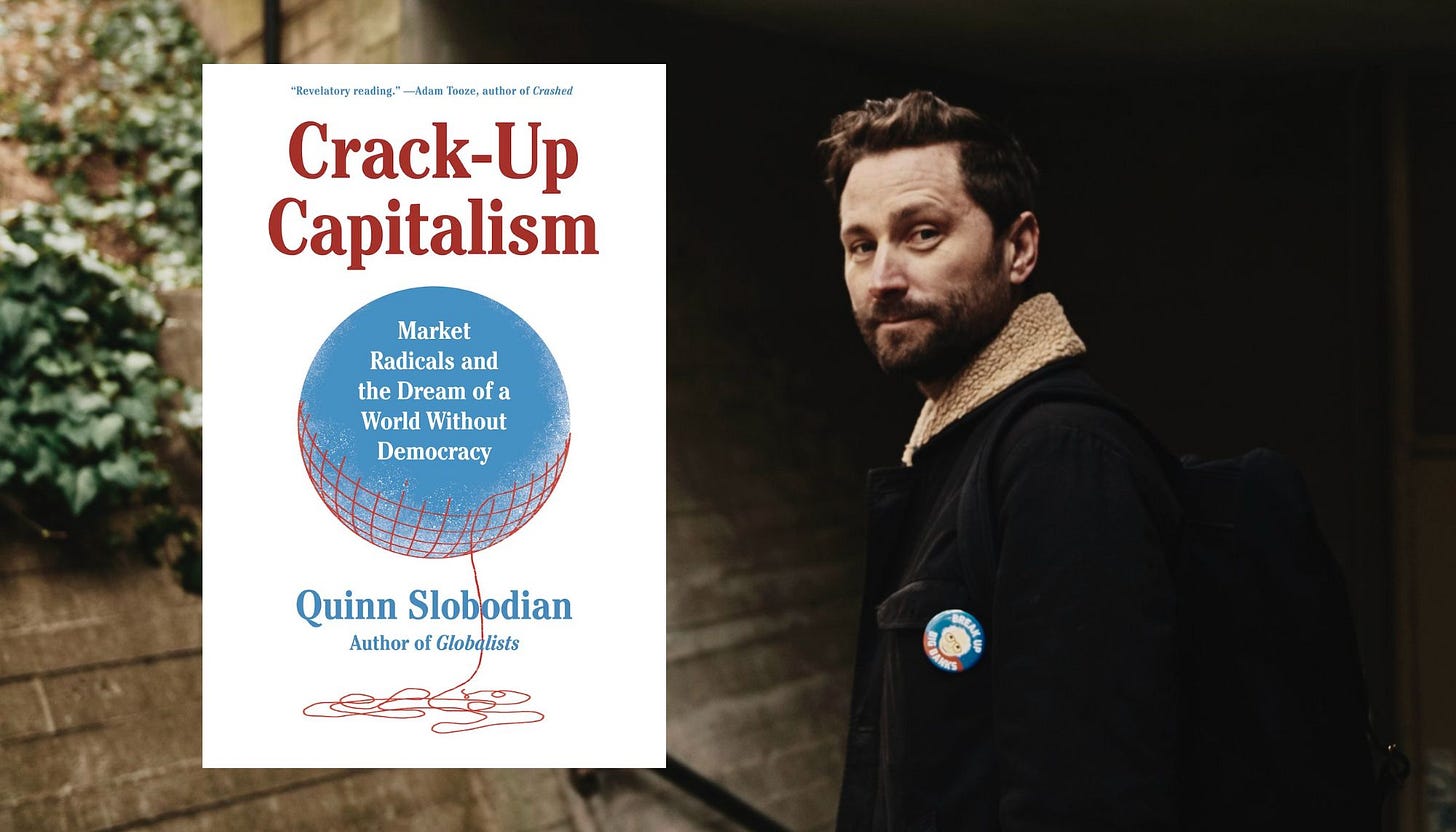The ‘Market Radicals’ Fighting for Capitalism Without Democracy
Quinn Slobodian’s ‘Crack-Up Capitalism’ shows how the interests of CEOs, investors, and ideologues are converging to undermine democracy.

This morning The Atlantic published my latest story: “The Billionaires Who Are Threatening Democracy.” The article is a review of historian Quinn Slobodian’s new book, Crack-Up Capitalism: Market Radicals and the Dream of a World Without Democracy, which reveals the powerful coalition of executives, investors, and libertarian ideologues who are striving to create new legal jurisdictions free of traditional rules and laws (like taxes).1
I hope you’ll read the story in The Atlantic. Thanks to Maya Chung, Gal Beckerman, and the team at The Atlantic for their thoughtful ideas, edits, feedback, and fact checks, and for publishing the piece.
What follows is another angle of this topic that I allude to in the article but don’t get into in detail. The thoughts below will probably be more interesting, and make more sense, after reading the original story.
THE ARTICLE OPENS with an anecdote about the billionaire hedge fund founder Ray Dalio hailing former Singaporean prime minister Lee Kuan Yew as “probably the greatest leader of the last 50 or 100 years.”2 Lee is considered the founder of modern-day Singapore; he ran the country with an exceedingly strong hand for more than three decades.
I first encountered Dalio’s admiration for Lee sometime in 2018 while listening to the audiobook of Dalio’s bestselling Principles. (In fact, I quoted a different line from Principles in my 2020 book Reframe the Day—one of a number of references and citations in Reframe the Day about which I’m having second thoughts. More on that another time.)
What has always struck me about Dalio’s repeated and enthusiastic embrace of Lee is that Lee was, without question, an authoritarian head of state. (His regime has been described as a “benevolent dictatorship.”3) Moreover, what Dalio embraces so repeatedly and enthusiastically is precisely Lee’s authoritarianism: his ability and willingness to run the city-state with what Dalio has praised as “firmness” and “strictness.” “We decide what is right,” Lee once remarked. “Never mind what the people think.”4
Dalio’s influence is significant. Besides creating the biggest hedge fund in the world, his books have sold more than five million copies.5 His YouTube, Twitter, and Instagram channels together have more than four million followers. He regularly speaks on elite stages around the world, and his prognostications about everything from investing to personal character to geopolitics routinely generate headlines.6
Yet while Dalio uses his platforms to opine on all sorts of matters, he appears noticeably less interested in certain topics. In 2021, for instance, Dalio was asked on CNBC whether he had concerns about investing in China given the Chinese government’s human rights record.7 “I can’t be an expert in those types of things,” Dalio responded, suggesting that his responsibility was to invest money where it would be welcome and profitable, not to consider how this money might be used.
Lack of expertise is a curious defense for someone who portrays himself as a geopolitical expert and thought leader, and who wrote a 500-plus-page book that promises an authoritative explanation of “why nations succeed and fail.”8
PERHAPS WE SHOULDN’T be surprised to find that CEOs and investors like Dalio, many of whom have made fortunes hedging in financial markets, also hedge their bets on democracy: celebrating it and enjoying its freedoms at home, while simultaneously taking advantage of its absence around the world.
But they hedge at home, too. For decades, the American political process has been generally deferential to the interests of corporations and their executives. When that bipartisan deference has been threatened, businesses’ public praise for the democratic process has been supplemented by their behind-the-scenes subversion of it—from lobbying and litigating, to funding manipulative PR and disinformation campaigns, to cycling key personnel into and out of government.
This approach has something in common with thinkers and ideologues who are more explicit about their crusade to do away with the democratic process altogether, and who aspire not to get rid of government but rather to capture the state and leverage its power and authority for their own ends.
THESE “MARKET RADICALS,” as Slobodian calls them, are an eclectic bunch. They include the corporations, executives, and investors who, like Dalio, are committed to maximizing profits while minimizing taxes and regulations, and who will happily deposit their money wherever it can accumulate undisturbed by U.S. taxes and regulations. And they include the more extreme figures who are ideologically committed to propping up antidemocratic politicians, who are convinced that the best way to save capitalism is to quit the project of democracy altogether—and who are continuing to gain influence on the political right.9
Some of these market radicals actively disdain democratic government. Others are simply disinterested in it. What unites them, I write in The Atlantic, “is the conviction that societies should be designed to prioritize capital, not people.”10 Crack-Up Capitalism is a powerful portrait of this dangerous convergence of interests.
https://us.macmillan.com/books/9781250753892/crackupcapitalism; https://www.nytimes.com/2023/03/12/opinion/economic-zones-global-economy.html
https://www.youtube.com/watch?v=oCSDfpeTkcU
https://www.theatlantic.com/international/archive/2015/03/lee-kuan-yew-conundrum-democracy-singapore/388955/
https://www.economist.com/obituary/2015/03/22/lee-kuan-yew
https://www.simonandschuster.com/books/Principles/Ray-Dalio/Principles/9781668010198
https://www.nytimes.com/2017/09/08/business/dealbook/bridgewaters-ray-dalio-spreads-his-gospel-of-radical-transparency.html
https://twitter.com/SquawkCNBC/status/1465660719756681218. After a backlash, Dalio later clarified that he “didn’t mean to convey that human rights aren’t important.”
https://www.wsj.com/articles/principles-for-dealing-with-the-changing-world-order-book-review-ray-dalio-trouble-ahead-as-usual-11637335545
https://www.profgalloway.com/quitters/; https://www.vanityfair.com/news/2022/04/inside-the-new-right-where-peter-thiel-is-placing-his-biggest-bets
https://www.theatlantic.com/books/archive/2023/05/crack-up-capitalism-quinn-slobodian-book-review/674064/



